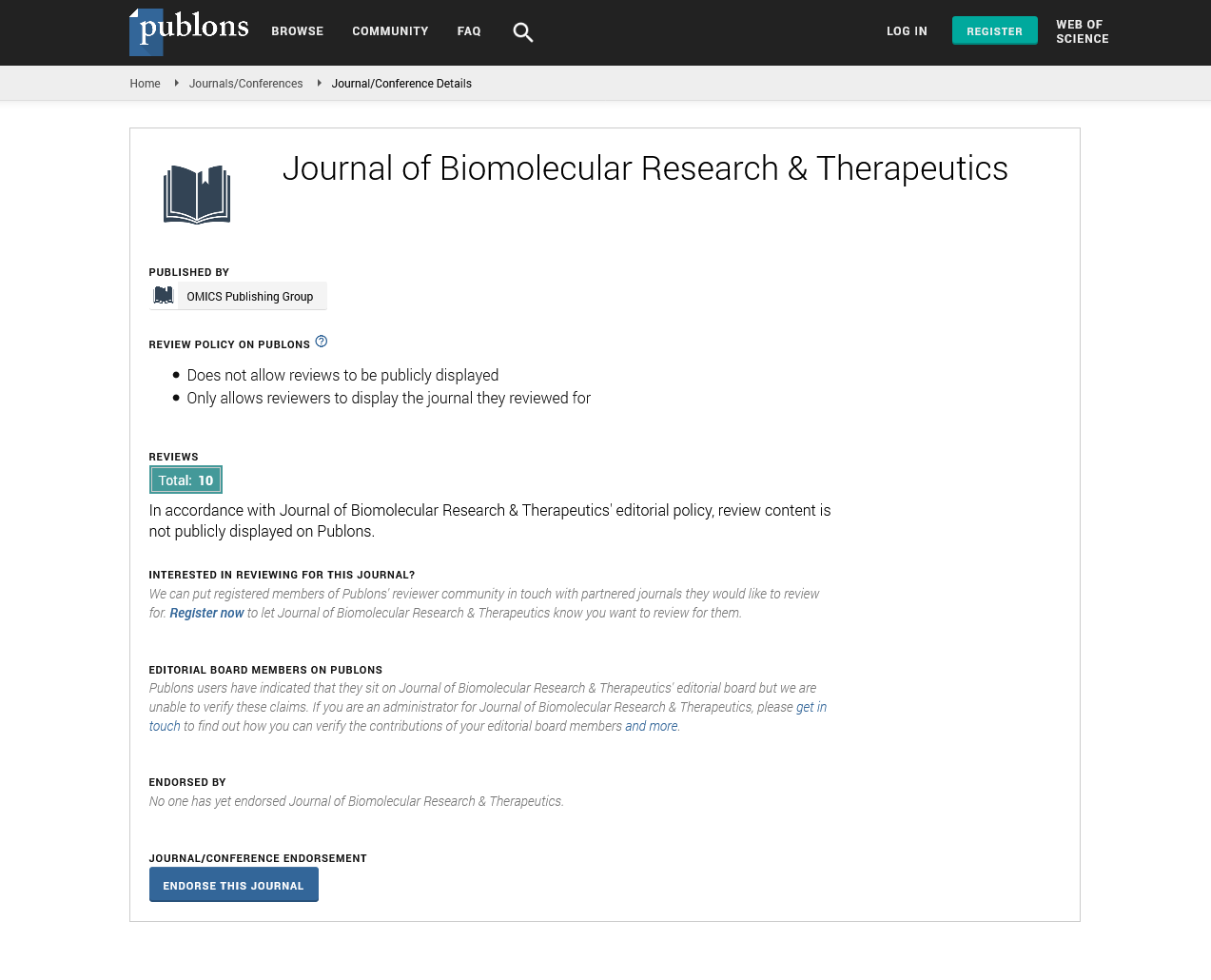Indexed In
- Open J Gate
- Genamics JournalSeek
- ResearchBible
- Electronic Journals Library
- RefSeek
- Hamdard University
- EBSCO A-Z
- OCLC- WorldCat
- SWB online catalog
- Virtual Library of Biology (vifabio)
- Publons
- Euro Pub
- Google Scholar
Useful Links
Share This Page
Journal Flyer

Open Access Journals
- Agri and Aquaculture
- Biochemistry
- Bioinformatics & Systems Biology
- Business & Management
- Chemistry
- Clinical Sciences
- Engineering
- Food & Nutrition
- General Science
- Genetics & Molecular Biology
- Immunology & Microbiology
- Medical Sciences
- Neuroscience & Psychology
- Nursing & Health Care
- Pharmaceutical Sciences
Commentry - (2023) Volume 12, Issue 6
Biotechnological Process and its Innovations in Transforming Industries
Xiu Hua*Received: 29-May-2023, Manuscript No. BOM-23-22356; Editor assigned: 01-Jun-2023, Pre QC No. BOM-23-22356(PQ); Reviewed: 15-Jun-2023, QC No. BOM-23-22356; Revised: 22-Jun-2023, Manuscript No. BOM-23-22356(R); Published: 30-Jun-2023, DOI: 10.35248/2167-7956.23.12.307
Description
Biotechnological processes harness the power of biological systems and organisms to develop innovative solutions and products across various industries. This interdisciplinary field integrates biology, chemistry, genetics and engineering to manipulate living organisms and their cellular components for practical applications. From healthcare and agriculture to environmental sustainability and industrial production, biotechnological processes have revolutionized numerous sectors offering Potential opportunities for advancements and discoveries. Biotechnological processes involve the use of living organisms their cellular components or biomolecules to develop new products improve existing processes or solve complex challenges. These processes can be categorized into several key areas, including genetic engineering, fermentation and bioprocessing and cell culture.
Genetic engineering is a foundational aspect of biotechnology enabling scientists to manipulate the genetic material of organisms to achieve desired traits or outcomes. Techniques such as recombinant DNA technology and gene editing tools like CRISPR-Cas9 have paved the way for groundbreaking advancements in healthcare, agriculture and industrial applications. Genetic engineering has led to the production of Genetically Modified Organisms (GMOs) the development of gene therapies and the engineering of crops with improved resistance to pests and environmental stress. Fermentation is a biotechnological process that involves the controlled growth of microorganisms (such as bacteria, yeast, or fungi) to produce valuable products through their metabolic activities. This process has been utilized for centuries in the production of alcoholic beverages, dairy products and bread. In modern biotechnology fermentation is central to the production of biofuels, enzymes, antibiotics and various bio products. The optimization of fermentation conditions and the selection of appropriate microorganisms are significant for achieving high yields and desired product quality. Bioprocessing is the integration of biological processes with engineering principles to scale up biotechnological processes for commercial production. This involves designing and operating large-scale bioreactors, optimizing nutrient supply and implementing efficient downstream processing techniques for product purification and recovery. Bioprocessing is critical in the production of biopharmaceuticals, vaccines and industrial enzymes among others.
Cell culture involves the controlled growth of cells outside their natural environment typically in a laboratory setting. This technique is extensively used in biomedical research, drug development and the production of cell-based therapies. In cell culture cells are provided with appropriate nutrients and conditions to thrive and proliferate making it possible to study their behavior screen for potential drugs and produce therapeutic proteins. Biotechnological processes have revolutionized medical treatments and therapies. They have enabled the production of recombinant proteins monoclonal antibodies and gene therapies, providing solutions for various diseases and medical conditions. Biotechnology has improved crop yields enhanced resistance to pests and diseases and facilitated the production of genetically modified crops with enhanced nutritional profiles. Biotechnological processes contribute to environmental conservation through the production of biofuels biodegradable materials, and waste treatment technologies. Biotechnology has applications in various industries, including biofuels production, bio-based chemicals and enzymes for industrial processes. Biotechnological processes play a role in cleaning up contaminated environments by employing microorganisms to degrade or neutralize pollutants. As biotechnological processes continue to advance, there are ethical and regulatory considerations to address. Regulations and guidelines are essential to ensure the ethical and safe implementation of biotechnological processes.
Biotechnological processes represent a dynamic and transformative field that continues to reshape the world in unprecedented ways. Harnessing the power of living organisms and cellular processes biotechnology has already made significant contributions to healthcare, agriculture, industry and the environment. As research and innovation in this field progress the potential for addressing global challenges and improving human well-being becomes even more promising. Ethical considerations and regulatory frameworks will continue to be crucial in guiding the responsible and sustainable development of biotechnological processes for the betterment of society and the planet.
Citation: Hua X (2023) Biotechnological Process and its Innovations in Transforming Industries. J Biol Res Ther. 12:307.
Copyright: © 2023 Hua X. This is an open access article distributed under the terms of the Creative Commons Attribution License, which permits unrestricted use, distribution, and reproduction in any medium, provided the original author and source are credited.

